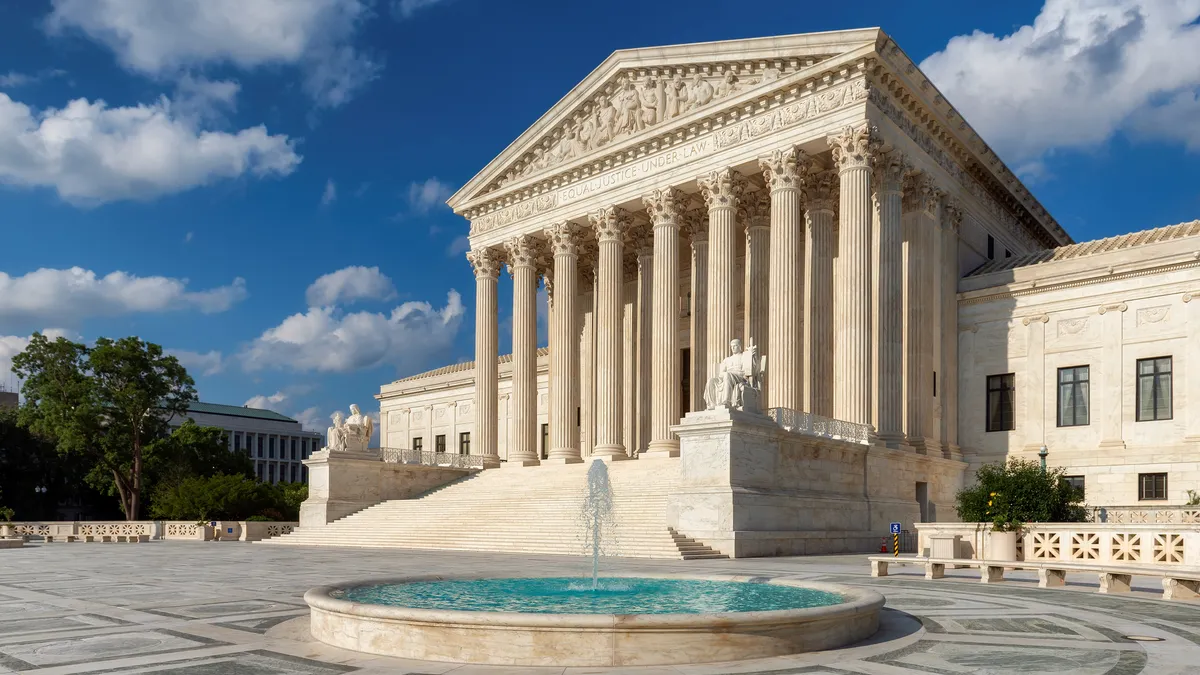U.S. Supreme Court justices appeared starkly split during nearly three hours of oral arguments on Tuesday in a case that has the potential to set precedent on parental opt-out policies for schools nationwide and weigh in on LGBTQ+ curriculum policies that have contributed to a polarized national landscape.
At the heart of Mahmoud v. Taylor is the question of whether public schools violate parents' religious freedom when exposing students to books on gender and sexuality without notifying parents or allowing them to opt their children out.
The case reached the high court after the 4th U.S. District Court of Appeals refused last May to block the LGBTQ+-inclusive elementary school curriculum of Maryland's largest school district. Montgomery County Public Schools had introduced the curriculum in the 2022-23 school year.
Disruptions vs. parental rights
The appeal to the Supreme Court comes from religious parents — many of whom are Muslim or Christian — and the parents of a student with Down syndrome and attention-deficit/hyperactivity disorder who said "their daughter's capacity to make independent judgments is impaired, making her particularly impressionable" to LGBTQ+ material.
Parents in Montgomery County had the ability to opt out of the elementary language arts curriculum until the school district reversed that policy because of the logistical difficulties in handling opt-out requests.
Parents argued that opt-outs were especially important for children in pre-K-5, but the district claimed the opt-out policies led to high student absenteeism. The district further said that administrators and teachers were unsure if they could accommodate "the growing number of opt out requests without causing significant disruptions to the classroom environment and undermining [the school system’s] educational mission."
The district also claimed in 4th Circuit appeals court documents that many opt-out requests it received were not religious in nature, and said some parents saw the curriculum as an effort to teach students material that wasn't age-appropriate.
Over 1,100 Montgomery County parents signed a public petition in 2023 opposing the reversal of the district's opt-out policy, and petitioners to the Supreme Court said the district violated parents' First Amendment rights.
Should opt-outs be age- and subject-specific?
In oral arguments Tuesday, multiple justices weighed whether the right to opt-out policies should be age- and subject-specific — something the parents' attorney, Eric Baxter, did not detail in arguments before the court.
"You've made a very broad argument here at times," Justice Samuel Alito said to Baxter. "And it might be good, it might not be good."
Some justices wondered whether parents' request to opt out of anything religiously objectionable to them would apply to subjects like evolution or to things besides curriculum materials, such as if a gay teacher displays a wedding photo on their desk or talks to students about their spouse. Justices also wondered whether a decision in favor of the Maryland plaintiffs could lead other parents nationwide to abuse the right to opt out.
Justice Sonia Sotomayor gave examples, for instance, of parents objecting to teachers reading books featuring divorce, interfaith marriage, immodest dress or women working outside the home because they run counter to the parents' religious beliefs.
"Are these all coercive?" asked Sotomayor. "Tell me where you're going to draw the line."
Justices also questioned whether opt-out policies should change according to a child's age.
"These are young kids’ picture books, and on matters concerning sexuality. I suspect there are a lot of non-religious parents who weren't all that thrilled about this, and then you add in religion, and that's even more serious," said Justice Elena Kagan, who went on to raise concerns about where plaintiffs would draw the line in the case of material presented to, say, a 17-year-old.
"You're not giving anything that would allow lines to be drawn." If no limits are imposed, she said, "it'll be like opt-outs for everyone."
A question of respect?
Justices acknowledged the complexity of the issue, as it concerns the rights of parents, children and LGBTQ+ people, as well as schools' objectives to teach inclusivity and respect.
"You don't need to understand your peers. You don't need to agree with them. You don't need to affirm with them," argued Alan Schoenfeld, attorney for the Montgomery County Board of Education. "But you do need to treat them with respect."
Some justices, however, weren't convinced that the district's policy centered on respect. “It's less about communicating respect for those who are transgender, who are gay, and more about how to think about sexuality," said Justice Amy Coney Barrett. One takeaway included in the curriculum, Barrett said, is that "your pronouns could change depending on the day."
Alito said the books had "a clear moral message" in favor of LGBTQ+ people.
Regardless of their ideological beliefs, the justices agreed it was a tough case to decide — and one with heavy consequences for both school practices and parental and children's rights.
"We typically lack the specialized knowledge and experience to know what t should be taught to kids and how, and to look at the instruction manual and say, ‘Is this a proper response?," said Justice Ketanji Brown Jackson. "I also think it's a concern that these questions don't always have one answer … Maybe in one community, one set of values, these books are fine, but in another community with a different set of values, they're not."
The justices are expected to issue a decision in the case by last June or early July when their current term ends.























